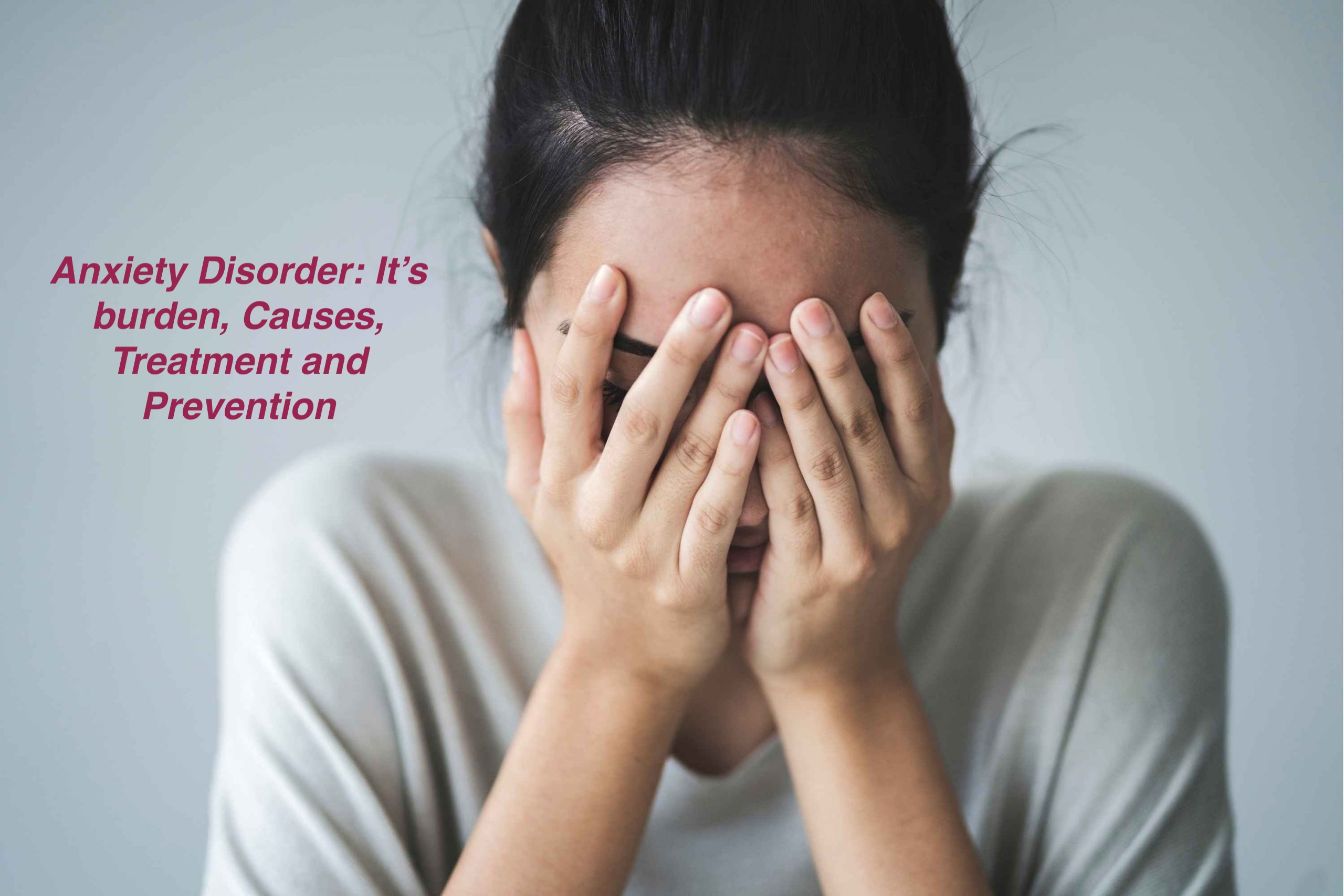
Anxiety Disorder: It’s burden, Causes, Treatment and Prevention
Anxiety disorders are some of the most prevalent mental conditions in the modern world.
As per estimate, 4.05% of the global population has an anxiety disorder, which translates to 301 million people. The number of persons affected has increased by more than 55% from 1990 to 2019. Anxiety disorder trends show a continuous increase in prevalence, incidence, and DALY ( disability adjusted life years) rates.
As per global data, Portugal has the highest prevalence (8,671 cases per 100,000), followed by Brazil, Iran, and New Zealand. The prevalence is higher in high-income regions.
Women are 1.66 times more likely to be affected by anxiety disorders than men.
The prevalence of anxiety disorders has been rising over the last three decades. The prevalence of anxiety appears to increase with socioeconomic development, a higher dependent older population, and urbanization. Future research can be done on this topic to include the development of more accurate cross-cultural metrics to assess anxiety and its correlates, as well as population-based studies to assess trends in anxiety over time.
What is anxiety disorder?
Anxiety disorders are biopsychosocial conditions associated with generalized or situation-specific responses to perceived threats.
Anxiety disorders are among the most common mental disorders. They usually appear early in life and share, however, sometimes with other mental disorders, a deliberately chronic evolution, and a strong functional impact.
We need to differentiate between stress and anxiety. This can be easily learnt from the picture below.
Causes of Anxiety disorders
Anxiety is a multifactorial disorder.
For some, it is related to specific environmental stimuli, resulting in phobias. Others may experience severe episodic distress, as in panic disorder. These experiences, when perceived as threats in the prefrontal cortex and the amygdala, trigger a fight-or-flight response, which can manifest in the form of a psychophysiological response like dizziness, increased heart rate, and sweating. If left untreated, chronic anxiety can result in many other health issues such as hypertension, cardiovascular disease, and dementia.
However, if we discuss the known specific causes of Anxiety, these are as follows
Causes of Anxiety:
- GENETIC FACTORS: There's evidence suggesting a genetic predisposition to anxiety disorders. Available clinical genetic studies point to a considerable heritability of anxiety disorders (30-67%). The predominant genes implicated in molecular genetic association studies are 5-HT1A, 5-HTT, MAO-A, COMT, CCK-B, ADORA2A, CRHR1, FKBP5, ACE, RGS2/7 and NPSR1. These genes have been shown to partially interact with each other genes as well as with environmental factors to shape the overall disease risk in a complex genetic model. Additionally, recent studies have pointed out the crucial role of epigenetic signatures such as methylation patterns in modifying environmental influences as well as in driving the functional impact of anxiety disorder risk genes.
- ENVIRONMENTAL FACTORS: Stressful life events, trauma, and adverse childhood experiences can contribute to the development of anxiety disorders.
Social anxiety disorder (SAD) is another term used to denote debilitating and chronic illness characterized by persistent fear of one or more social or performance situations, with a relatively high lifetime prevalence of 7% to 13% in the general population. Although the last two decades have witnessed enormous growth in the study of biological and dispositional factors underlying SAD, comparatively little attention has been directed towards environmental factors in SAD, even though there has been much ongoing work in the area. In this paper, we provide a recent review and critique of proposed environmental risk factors for SAD, focusing on traditional as well as some understudied and overlooked environmental risk factors: parenting and family environment, adverse life events, cultural and societal factors, and gender roles.
- NEUROCHEMICAL IMBALANCE: Imbalances in neurotransmitters, such as serotonin and norepinephrine, are associated with anxiety.
The neurotransmitters serotonin, dopamine, norepinephrine, and gamma-aminobutyric acid (GABA) are specifically believed to be linked to mood and anxiety disorders.? These neurotransmitters are in charge of regulating various bodily and mental functions. Serotonin is a neurotransmitter that is largely associated with mood, sleep, appetite, and other regulatory functions in the body. Experts have also found that reduced levels of serotonin are connected to depression and anxiety. The neurotransmitter dopamine may also contribute to symptoms. Dopamine influences, among other functions, a person’s energy levels, attention, rewards, and movement. Norepinephrine is also related to anxiety as it released in the fight-or-flight response, or they physiological response to stress. Last, GABA plays a role in balancing excitement or agitation and inducing feelings of calm and relaxation through its inhibitory effect.
Abnormal functioning of neurochemicals as well as abnormal chemoreceptor reactivity leads to anxiety. There are various neurotransmitters that are involved in anxiety such as serotonin, glutamate, gamma-amino butyric acid, Cholecystokinin, Adenosine etc. Some are inhibitory and some are excitatory. These neurotransmitters might play role in upregulation or downregulation of anxiety disorders. This review article gives a bird’s eye view of neurotransmitters involved in anxiety.
PERSONALITY FACTORS: Certain personality traits, such as neuroticism, may increase the risk of developing anxiety disorders. Some personality traits are more prone to anxiety, but having these traits doesn’t necessarily mean you’ll suffer from clinical or chronic anxiety or that a mild form of the condition will progress into a severe bout of the disorder. However, researchers have noted that certain personality traits show up time and again among those people diagnosed with the condition. The following are among the five personality traits most often prone to anxiety.
A. OVER-THINKING
Thinking is generally construed as a good thing! However, a tendency to overthink is often related to more serious anxiety. After all, people with anxiety often can’t stop thinking about their worries or fears. Someone who overthinks a situation is more apt to form an unhealthy focus on their thoughts. Obsessing about a negative situation can create a rut in the mental road that’s hard to get unstuck from. Often, overthinkers are big planners. When their plan is thwarted, it can throw them into an emotional tailspin, leading to symptoms of anxiety.
B. PERFECTIONISM
Many people with perfectionism are aware that perfection is invariably unattainable, yet they continue to give it their best effort. Perfectionism, however, is all too often associated with disappointment. Mistakes and shortcomings are facts of life. When a person becomes stressed about achieving an ideal or fears that they will fail to meet their goals, they could develop symptoms of anxiety. Wanting to be one’s best is an admirable trait, but an unwillingness to settle for less can trigger anxiety.
C. RESISTANCE TO CHANGE
Change isn’t always easy, but for many people, it can be downright scary and loathsome. People who find change difficult may be more prone to experiencing anxiety. These changes can be small— a new computer program at work or a new neighbour moving in next door. Yet, changes such as these can invite a level of worry that veers out of bounds for someone who finds change hard. Big changes like the loss of a loved one or job can lead to major symptoms of anxiety for people who struggle with change.
D. EMPATHY
Empathy is something most people value in another person. An empathetic individual can put themselves in someone else’s shoes; they feel intensely and are sensitive to the feelings of others. Yet, empathy can contribute to anxiety in some ways. An empathetic person suffering from anxiety may feel a heightened degree of sensitivity and strong emotional responses that can be difficult to control. When feelings like fear and worry set in, they can become so intense that the individual finds it challenging to control them.
E. INTROVERTED
Finally, people who tend to be introverted may suffer from clinical anxiety more than those who are extroverted. This makes sense because introverts tend to keep their thoughts and feelings inside. When they’re feeling balanced, they can easily manage their thoughts and feelings, but when they’re stressed, those bottled thoughts and emotions may find no effective release, leading to anxiety.
We will discuss the therapeutic options of anxiety in the next article.
Do let me know in the comments if you guys want another blog on any of the health topics.
